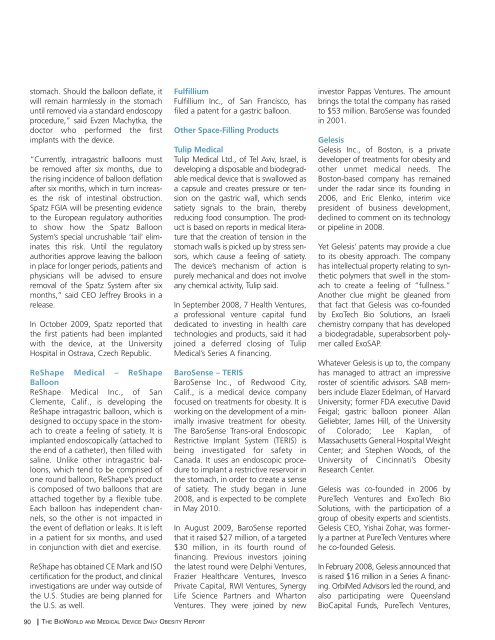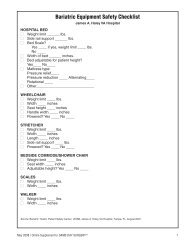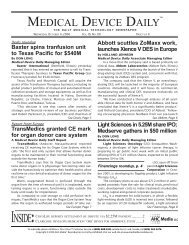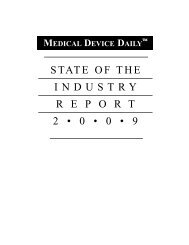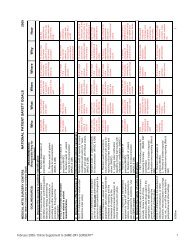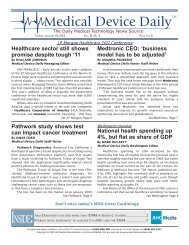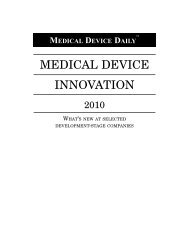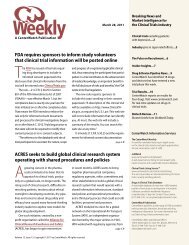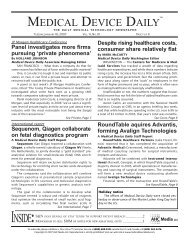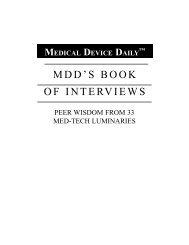You also want an ePaper? Increase the reach of your titles
YUMPU automatically turns print PDFs into web optimized ePapers that Google loves.
90<br />
stomach. Should the balloon deflate, it<br />
will remain harmlessly in the stomach<br />
until removed via a standard endoscopy<br />
procedure,” said Evzen Machytka, the<br />
doctor who performed the first<br />
implants with the device.<br />
“Currently, intragastric balloons must<br />
be removed after six months, due to<br />
the rising incidence of balloon deflation<br />
after six months, which in turn increases<br />
the risk of intestinal obstruction.<br />
Spatz FGIA will be presenting evidence<br />
to the European regulatory authorities<br />
to show how the Spatz Balloon<br />
System’s special uncrushable ‘tail’ eliminates<br />
this risk. Until the regulatory<br />
authorities approve leaving the balloon<br />
in place for longer periods, patients and<br />
physicians will be advised to ensure<br />
removal of the Spatz System after six<br />
months,” said CEO Jeffrey Brooks in a<br />
release.<br />
In October 2009, Spatz reported that<br />
the first patients had been implanted<br />
with the device, at the University<br />
Hospital in Ostrava, Czech Republic.<br />
ReShape <strong>Medical</strong> – ReShape<br />
Balloon<br />
ReShape <strong>Medical</strong> Inc., of San<br />
Clemente, Calif., is developing the<br />
ReShape intragastric balloon, which is<br />
designed to occupy space in the stomach<br />
to create a feeling of satiety. It is<br />
implanted endoscopically (attached to<br />
the end of a catheter), then filled with<br />
saline. Unlike other intragastric balloons,<br />
which tend to be comprised of<br />
one round balloon, ReShape’s product<br />
is composed of two balloons that are<br />
attached together by a flexible tube.<br />
Each balloon has independent channels,<br />
so the other is not impacted in<br />
the event of deflation or leaks. It is left<br />
in a patient for six months, and used<br />
in conjunction with diet and exercise.<br />
ReShape has obtained CE Mark and ISO<br />
certification for the product, and clinical<br />
investigations are under way outside of<br />
the U.S. Studies are being planned for<br />
the U.S. as well.<br />
THE BIOWORLD AND MEDICAL DEVICE DAILY OBESITY REPORT<br />
Fulfillium<br />
Fulfillium Inc., of San Francisco, has<br />
filed a patent for a gastric balloon.<br />
Other Space-Filling Products<br />
Tulip <strong>Medical</strong><br />
Tulip <strong>Medical</strong> Ltd., of Tel Aviv, Israel, is<br />
developing a disposable and biodegradable<br />
medical device that is swallowed as<br />
a capsule and creates pressure or tension<br />
on the gastric wall, which sends<br />
satiety signals to the brain, thereby<br />
reducing food consumption. The product<br />
is based on reports in medical literature<br />
that the creation of tension in the<br />
stomach walls is picked up by stress sensors,<br />
which cause a feeling of satiety.<br />
The device’s mechanism of action is<br />
purely mechanical and does not involve<br />
any chemical activity, Tulip said.<br />
In September 2008, 7 Health Ventures,<br />
a professional venture capital fund<br />
dedicated to investing in health care<br />
technologies and products, said it had<br />
joined a deferred closing of Tulip<br />
<strong>Medical</strong>’s Series A financing.<br />
BaroSense – TERIS<br />
BaroSense Inc., of Redwood City,<br />
Calif., is a medical device company<br />
focused on treatments for obesity. It is<br />
working on the development of a minimally<br />
invasive treatment for obesity.<br />
The BaroSense Trans-oral Endoscopic<br />
Restrictive Implant System (TERIS) is<br />
being investigated for safety in<br />
Canada. It uses an endoscopic procedure<br />
to implant a restrictive reservoir in<br />
the stomach, in order to create a sense<br />
of satiety. The study began in June<br />
2008, and is expected to be complete<br />
in May 2010.<br />
In August 2009, BaroSense reported<br />
that it raised $27 million, of a targeted<br />
$30 million, in its fourth round of<br />
financing. Previous investors joining<br />
the latest round were Delphi Ventures,<br />
Frazier Healthcare Ventures, Invesco<br />
Private Capital, RWI Ventures, Synergy<br />
Life Science Partners and Wharton<br />
Ventures. They were joined by new<br />
investor Pappas Ventures. The amount<br />
brings the total the company has raised<br />
to $53 million. BaroSense was founded<br />
in 2001.<br />
Gelesis<br />
Gelesis Inc., of Boston, is a private<br />
developer of treatments for obesity and<br />
other unmet medical needs. The<br />
Boston-based company has remained<br />
under the radar since its founding in<br />
2006, and Eric Elenko, interim vice<br />
president of business development,<br />
declined to comment on its technology<br />
or pipeline in 2008.<br />
Yet Gelesis’ patents may provide a clue<br />
to its obesity approach. The company<br />
has intellectual property relating to synthetic<br />
polymers that swell in the stomach<br />
to create a feeling of “fullness.”<br />
Another clue might be gleaned from<br />
that fact that Gelesis was co-founded<br />
by ExoTech Bio Solutions, an Israeli<br />
chemistry company that has developed<br />
a biodegradable, superabsorbent polymer<br />
called ExoSAP.<br />
Whatever Gelesis is up to, the company<br />
has managed to attract an impressive<br />
roster of scientific advisors. SAB members<br />
include Elazer Edelman, of Harvard<br />
University; former FDA executive David<br />
Feigal; gastric balloon pioneer Allan<br />
Geliebter; James Hill, of the University<br />
of Colorado; Lee Kaplan, of<br />
Massachusetts General Hospital Weight<br />
Center; and Stephen Woods, of the<br />
University of Cincinnati’s Obesity<br />
Research Center.<br />
Gelesis was co-founded in 2006 by<br />
PureTech Ventures and ExoTech Bio<br />
Solutions, with the participation of a<br />
group of obesity experts and scientists.<br />
Gelesis CEO, Yishai Zohar, was formerly<br />
a partner at PureTech Ventures where<br />
he co-founded Gelesis.<br />
In February 2008, Gelesis announced that<br />
is raised $16 million in a Series A financing.<br />
OrbiMed Advisors led the round, and<br />
also participating were Queensland<br />
BioCapital Funds, PureTech Ventures,


